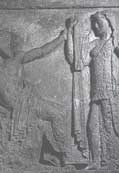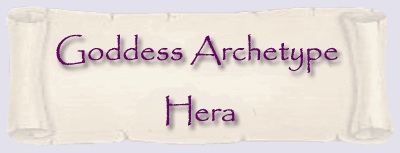
|
A brief psychological overview of Hera
Hera - possesses an extroverted temperament and a focus on issue of outer world control/power. She represents goddess of marriage--concerned with partnership and her relationship as wife to a man. She faces life challenges regarding power, status and leadership. Hera belongs to the relationship-oriented ‘vulnerable’ goddess category, suffering humiliation by her god husband, Zeus. In fact, Zeus was her twin brother. He attempted, unsuccessfully, to court her so he disguised himself as a shivering little bird to obtain pity from her. His ruse worked, when she tenderly drew him to her breast, he returned to his true shape and raped her. She was shamed into marrying him. As her husband, he also shamed her by engaging in numerous extramarital sexual liaisons, further causing her humiliation. Hera had allegedly led a conspiracy against Zeus as an act of revenge.

A Hera type woman desires a highly successful, powerful man as her partner--one who will share his power and status with her. Traditional in her values, she seeks social prestige and matriarchal rulership through marriage. Her awareness is focused.

It is believed that the myth of the conflictual marriage of Zeus and Hera relates back to the time when a barbarous northern tribe invaded Greece around 1000 B.C.E., bringing with them their masculinized sky gods. The ancient Greeks at this time were believed to be revering the mother goddess and celebrating her magical powers. Historians suggest that the invaders, occupying this feminine culture, overpowered them and forced their submission to the invaders’ beliefs. From the perspective of myth and psychology, the feminine culture of ancient Greece was ‘raped’ and coerced into ‘marriage’ to the barbarous invader tribe. In this way, Hera represents the uniting of feminine and masculine energies.
See the Goddess Typology Quiz
to determine your various goddess characteristics
Back to the Home Page

The ancient Olympian Goddesses -
a deeper look
Hera - represents the feminine archetype of wife and matriarch of the family; she thrives in the partnership of marriage, particularly to a powerful husband whose high degree of success and prestige privileges her to enjoy position of status and power. Hera, the Greek goddess, presided over marriage and embodies the instinct to become mated.

Mythological history: Hera was married to the supreme deity, Zeus. He was her only husband. Her role in Greek mythology was goddess of marriage. She suffered from his numerous affairs with other goddesses and mortals, alike. She was said to punish these participants in harsh ways. The ancient Greek writers appear to portray her as a stereotypical nagging, evil-tempered woman full of petty revenges. However, prior to the Greeks, the more ancient cult that worshipped her celebrated in her honor the hieros gamos, the ‘Sacred Marriage’. This sacred festival celebrates the Earth Goddess and the Sky god regenerating the cosmos with their lovemaking. This ancient Hera goddess in earlier matriarchal times was a complete, whole woman in her own right. The Zeus--Hera marriage of later Greeks refers to the barbarous hunter tribe who invaded Greece at the end of the second millennium B.C.E and imposing their masculine deities--forcing a ‘marriage’ between the matriarchal cults and patriarchal dominance.

Psychologically, Hera belongs to the ‘vulnerable’ goddess category, suffering humiliation at the hand of her husband/deity Zeus through his shameless infidelities.
-
To the Romans Hera was known as Juno.
-
Hera was born to Rhea and Cronos, one of their last children. Cronos had also swallowed her at birth--she was already a young girl when she emerged from him. Instead of being raised by her parents, she was put into the care of two nature deities who acted as elderly foster parents.
-
Hera woman subscribes to the fundamental value of traditional home and family; she is single-mindedly prepared to sacrifice her own career to achieve the solid and respected and prestigious status for her family as wife of successful, powerful man.
-
Young Hera woman sees her self-completion through her marriage--in her new identity as wife and helpmate to her promising, striving husband.
-
Hera energy is most visible in mature women, therefore, in the second half of life when she is more able to enjoy the full impact of her natural authority and dignity--possessing executive, leadership ability.
-
Hera woman at a younger age is looking, first and foremost, for a husband--admires and seeks a strong, ambitious male, a male most promising to succeed--Attaining marriage status, she will dutifully remain home raising her family, putting her own individual career ambitions on hold while fostering the beginnings of a growing family. Hera-type sees this strategy as an investment for her future
-
Hera-type who miscalculates her husband’s promse of success may take to manipulate him behind the scene--directing and calculating his moves--nagging and even bullying him tio achieve in accordance with her expectations
-
Hera-type’s masculine drive within a partnership is less likely to be sublimated in creative ways. Due to her need for power in relationship, and particularly in one that is unequal, she becomes increasingly frustrated and angry, driven and unbalanced. She may become verbally abusive toward her family, venting her disappointment in them; she may turn to alcohol or other feeling-numbing patterns
-
Hera-type exhibits exacting standards toward her children--often in an over-disciplined style typically learned from her own mother. She trains her children of her expectations of good behavior, obedience, politeness--she is more like a ruler than a nurturer.
-
Hera-type mothers run the risk of holding high ambitions for their children, directing the adult child’s career in a direction that may be more in line with her own neglected personal goals rather than recognizing or nurturing her adult child’s dreams
-
Aspiring to prominence, Hera woman enjoys a natural affinity with power, and sometimes, elitism or snobbery, potentially bordering on arrogance, intemperance, self- righteous, and also self-assured, strong-willed, authoritative.
-
Hera woman demands high standards; she may appear critical, opinionated and dictatorial. She knows exactly what she wants.
-
In appearance she is conservatively, albeit, well-dressed and frequently emanating a ‘large’ presence even if she is not physically so.
-
Hera woman highly values social position and is found heading up planning committees, board of directors, country club meetings, charity organizations, fund-raiser banquets--making the calls and contacts
-
Hera woman at home is experienced as the ‘Queen Bee’--“ruling” her extended family as the matriarch--she loves family occasions--more, however, for the enjoyment of ‘reverence’ due her from her family. She has a strong notion of respectability
-
Hera woman, having traveled by her husband’s side in his climb to the ‘top’, typically becomes his chief confidante and advisor; she is able to influence him, considerably.

-
Challenges facing Hera
-
If she marries a man who ultimately does not meet with success, she may manipulate him behind the scene--typifying the light/dark couple--polite, accommodating husband and domineering wife.
-
She can become unbalanced psychologically and driven intensely by the very thing she wants to control.
-
She may stay committed to an unhealthy relationship or marriage - one in which she suffers her husband’s infidelities. She may exhibit repeated jealousy and vindictiveness - rather than recognizing the unhealthy pattern and leaving the relationship.
-
Addiction to perfection

-
Hera’s dark side: Financial and emotional dependence on her husband - her own unexplored autonomy - her unlived life apart from that of her marriage - her limited relationship to her own sexuality. Her issue - her unrecognized lust for power.

-
Hera’s wound: Hera was denigrated by the patriarchal ancient society--originally, held in esteem as a powerful and revered goddess of the sacred ritual of marriage; later demoted and disparaged as a jealous, vindictive and quarrelsome wife.

-
Hera’s gifts: As an ancient pre-Hellenic goddess, she represents the highest form of marriage--of Queen and King--of union of feminine and masculine.
-
Hera’s gift is her capacity to unite, to commit and to be a loyal and faithful partner.
-
Hera’s ideal - a complete and whole woman in her own right in honor of the feminine principle. The ‘marriage’ represents, psychologically, the marriage of her own feminine and masculine energies. Her partner, then, will mirror her own inner opposite qualities. She chooses, in her partner, the most longed for and most important images of her own inner, and, as yet unknown self--a major psychological undertaking and emotional work.

-
Hera’s ideal - a complete and whole woman in her own right in honor of the feminine principle. The ‘marriage’ represents, psychologically, the marriage of her own feminine and masculine energies. Her partner, then, will mirror her own inner opposite qualities. She chooses, in her partner, the most longed for and most important images of her own inner, and, as yet unknown self--a major psychological undertaking and emotional work.

-
Hera’s personality
-
As a child & adolescent:
-
A primarily Hera type child will typically be found playing house - but not by being ‘mommy’ nurturing her dollies - rather, she is the ‘big person’ keeping house for her husband.
-
She may have a boyfriend earlier than most girls--say, 6 or 7 years of age.
-
By adolescence she is definitely ‘going steady’ - dreaming of becoming a wife.
-
She is most often status-conscious - she will be seeking out the top sports ‘jock’, or class president; being part of the ‘in’ crowd is important to her. She wants to be the ‘in’ couple.
-
College is most likely the place for her to find a suitable husband rather than finding her own autonomous goals.

-
-
As an adult woman:
-
Hera types typically do not have close female friendships - her female friends are, as she is, part of a couple, frequently the wives of her husband’s business associates. Hera women typically drop their women friends who are no longer coupled, thus, reinforcing that woman has no relevance without a husband.
-
Sexuality is typically not enjoyed for its own pleasures, rather, as a wifely aspect of marriage - it is not unusual for her to be inorgasmic for many years.
-
As a mother Hera tends to demand proper behavior, enforcing rules and holding high expectations of her children, academically and socially.

-
Historic females embodying the Hera archetype: Queen Victoria in the 19th century and Abigail Adams (wife of President John Adams and mother of President John Quincy Adams); Ladybird Johnson; Nancy Reagan.
|

|



